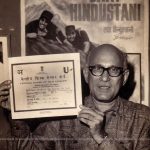Wajid Ali Shah Award – Strongest Voice
Roop Rekha Verma may look frail but she is perhaps one of the strongest voices amongst women in Lucknow today. For the same reason the former Vice Chancellor and head, Philosophy Department of the University of Lucknow was given the Wajid Ali Shah Award recently at the second edition of the Lucknow Literary Festival.
Professor Verma is also recognized for founding the Institute of Women’s Studies at the University of Lucknow. After her retirement in 2003, she devotes all her time to Saajhi Duniya, a social organisation that works to build a world based on sharing, cooperation and respect for socio-religious pluralities.
Where ever there is violence and rioting, Professor Verma invariably visits the place. And most of the time she has found that there is no hatred for the other in the heart of ordinary citizens. It is hate mongers who come from the outside to create tension and then fan it so that it leads to murder, mayhem and to the start of a vicious cycle of revenge amongst mostly peace loving people.
And in the midst of murder when she finds incidents of mercy and kindness, her faith in humanity is renewed. That is what keeps her doing what she does despite challenges of living and working in a male dominated society.
Professor Verma says that her social activism began with anger that took root in her as a child. She grew up in a small city without much exposure to modernity. Through a window without curtains she saw a woman being kicked and slapped by a man in the neighbourhood. She recalls watching a high caste Hindu beat up a sweeper boy. The obsessive worry of parents for a not-so-fair-skinned daughter made her angrier.
Her interest in women’s issues came from literature and the media and the writings of Razia Sajjad Zaheer and Rashid Jahan impacted her greatly. The first public event she organised on women’s issues was an exhibition of handmade posters along with some plays and songs on communal harmony.
She watches the women’s movement grow, but also sees its shortcomings. The biggest shortcoming of the women’s movement is that sometimes activists jump into activism without any clear understanding of the issues involved or a clear strategy to handle the problems faced. It is important to keep a constant eye on, and to critique existing structures of culture and religion laid out by the patriarch. It is to save the women’s movement from being co-opted by commercialisation and market forces that are patriarch-friendly. There are other forces that want to co-opt women in the name of religion and tradition. Professor Verma disapproves of modernity that tries to shape women into body-centric and sexually usable creatures.
How to hold onto an autonomous personhood, and to achieve equal citizenship is the biggest challenge before all women, says the founder of Saajhi Duniya that was started in the late 1980s.
This was the time when divisive forces had tried their best to divide Lucknow on the basis of religion and to pitch the majority population against the minorities purely for self gain. Gradually more people joined Saajhi Duniya to continue to campaign intensively for secular principles. Both small and big meetings were held, pamphlets distributed, rallies organised and relief work done in favour of peace amongst all human beings of the city. This was at a time when religious fanatics had threatened the peaceful co-existence amongst citizens and provoked people by demolishing a 16 century mosque in Faizabad.
Over time the work of Saajhi Duniya has expanded to include issues like gender, education and human rights.
Today, the work on gender issues, in particular violence against women has intensified and a large number of destitute women from all over Uttar Pradesh (UP) are provided services from counseling to helping them fight a case in the court of law.
There is also a curriculum to sensitize women against being exploited. The trained women then train other women and those who have learnt to read and write enough teach others to do the same.
However, for the women’s leadership movement to expand and to spread in the right and healthy direction, Saajhi Duniya desperately needs better facilities and funds.




